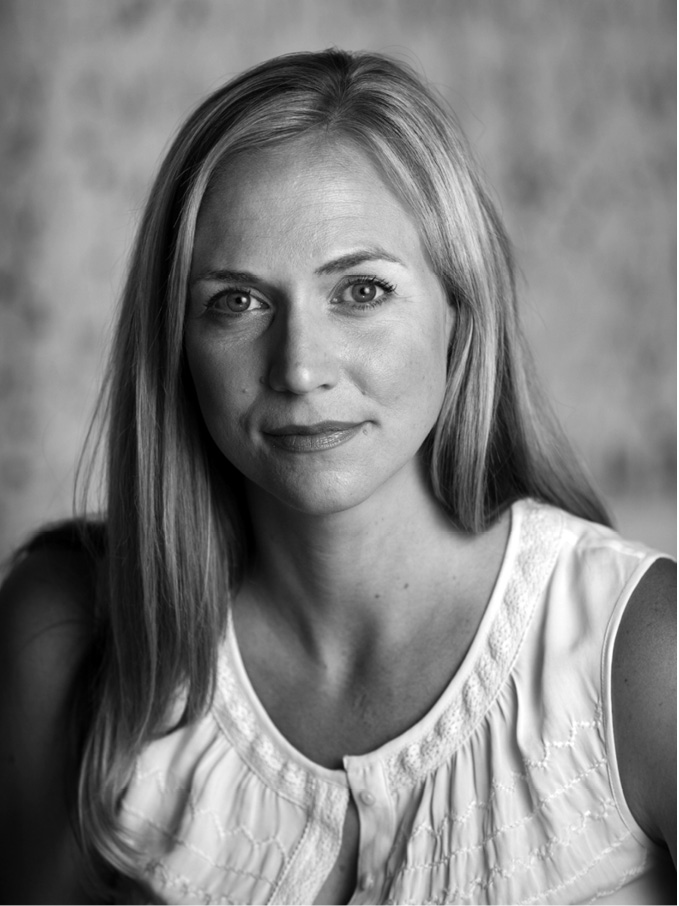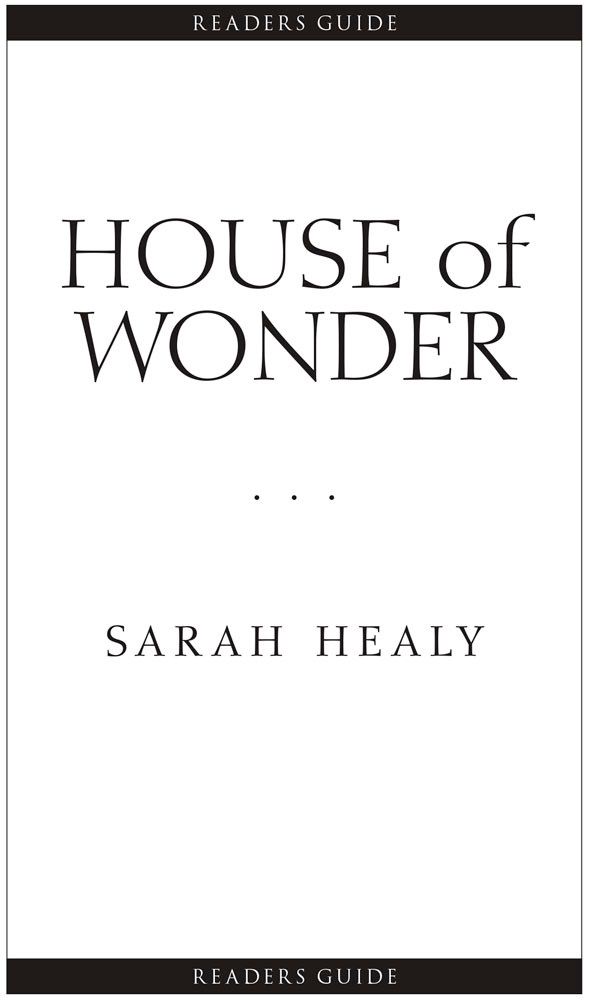House of Wonder (27 page)
Authors: Sarah Healy

My wonderful agent, Stephanie Kip Rostan, had to endure more than her fair share of less than perfect manuscript reading for this book, and provided honest and invaluable feedback with each version. She is a true professional.
My editor, Ellen Edwards, refused to accept anything less than my very best work, and for that, I am extremely grateful.
Jennifer Enderlin Blougouras and Erin Enderlin Bloys are not only my most steadfast, exacting, and valued readers, but also my sisters. I trust their opinions on literature, if not processed cheese products, wholly. My brother Jonathan Enderlin saved me from certain peril when, as a kid, I set myself adrift on the Gulf of Mexico in a vessel known as the “Party Tuber.” And my brother Matthew Enderlin was my compatriot in childhood. I'm fortunate to call the lot of them family.
Several people helped with advice and information along the way. Olivier Sakellarios, Esq., provided input on my first draft so long ago that he probably doesn't even remember it,
but let's still consider any errors or inaccuracies in this book entirely his fault. My friend Kristen Deshaies has a wonderful mind and heart, so we must forgive her for handing out raisins on Halloween. Sean W. Craine is a human being of the finest order. And I'm glad Stephen Moore is on my side.
I'd like to thank Sheila White Moore, James White, Marlow White Jr., Audrey Healy, Tom Healy, Phyllis Donohue, and all of my extended familyâWhites, Moores, Francises, and Healysâfor being such enthusiastic supporters.
It was my father, Peter Enderlin, who taught me the importance of telling the truth and my mother, Maureen Enderlin, who taught me to do so with compassionâwhich I think is a good way to try to live and write.
And finally, my husband, Dennis Healy, has seen me through the writing of this book and so much more. He and our three sons, Noah, Max, and Oliver, are my reasons for everything. I love them boundlessly.

Photo by Shem Roose
Sarah Healy
lives in Vermont with her husband and three sons, where she works in marketing consultancy.
CONNECT ONLINE
sarah-healy.com
facebook.com/sarahhealyauthor

Spoiler Alert: The Conversation with Sarah Healy and Questions for Discussion that follow tell more about what happens in the book than you might want to know until after you read it.
Q. You've said that
House of Wonder
is, above all, a novel about family. Can you explain what you mean and what inspired you to write it?
A. I've always been drawn to stories about families because there is something so universal about having to reconcile with your upbringing. Almost everyone I know, no matter how old, regresses a bit when around family and assumes the roles that they've always tended to play. I'm very fortunate that my own family is made up of some of my favorite people in the world, but I think it's always a process to figure out how to relate to your parents and siblings as an adult. And that process lies at the core of Jenna's narrative.
Q. Both Priscilla's mother and Warren suffer from an undiagnosed condition or disability, but their experiences fifty years apart are very different. Why was it important to you to include both characters? And why did you want to show a family history, rather than make Warren's condition unique to him?
A. In part, I wanted to explore the impulse to try to fit both Warren and Martha into the box of a diagnosis. Our culture tends to pathologize any behavior that deviates from the norm. Often, this is for a very good reasonâbecause it can help us understand an individual and determine a treatment protocol. However, I don't think we can ignore the fact that treatments that were once acceptable can look misguided or even barbaric from a modern perspectiveâas is the case with the lobotomy to which Martha Harris was subjected.
Also, Priscilla is so central to this story that I wanted to afford the reader a deeper insight into both her devotion to her son and the conditions in which she allows herself to live through glimpses of her childhood and the loss of her mother.
Q. Your description of the beauty pageants Priscilla competes in reminded me of pageants I watched on TV while growing up in the sixties, whenâI'm chagrined to admit itâI found nothing objectionable in comparing women's breast, waist, and hip sizes. How my attitude has changed! Can you comment on how we viewed beauty pageants then, and how we do now, and what you wanted to convey about them in the novel?
A. It seems that pageants used to be much more in the cultural fore than they are today. When I was growing up, the Miss America franchise was still a very big deal. But as the arenas and fields in which women could compete broadened, pageants lost some relevancy. Priscilla, though, is a product of a time and a place when “pretty” is one of the most important things a girl can aspire to be. That shapes her life in significant ways.
Q. Your description of the suburban neighborhood in which Jenna grew up, where her mother still lives, struck a note of recognition in me, and I suspect it will in many readers. Is this the kind of place where you grew up? Did it have Maglons?
A. I didn't grow up in a neighborhood like King's Knoll, but I did grow up in suburban New Jersey. The suburbs seem like such a perfect metaphor for adolescence, because they have always struck me as a place where fitting in is valued above almost all else.
My town didn't have “Maglons,” but if it had, I would have been ready with my forsythia branches! I could have only hoped to have Howard Li at my side. . . .
Q. The neglect and outright abuse that Priscilla suffers as a child seems to me to have been more prevalent in the fifties than it is nowâor is that a misconception?
A. I would be so happy to say that mistreatment like what Priscilla endured doesn't happen anymore, but unfortunately, I just don't think that's the case. Humanity has not evolved past
cruelty. But humanity has not evolved past kindness either and on balance, I think we have a much greater capacity for the latter.
Q. What do you hope that readers will take away from
House of Wonder
, and remember long after they finish reading?
A. I hope my characters stay with peopleâJenna, Silla, and especially Warren. Warren has been marginalized and dismissed for most of his life, but he has a wonderful, unique soul. I felt privileged to get to know him through the writing of this book. And there are probably more Warrens out there in the world than any of us realize.
Q.
House of Wonder
is your second novel, following
Can I Get an Amen?
, which also takes place in suburban New Jersey. Are there any other similarities between the two novels?
A. In some ways, they are both coming-of-age novels. . . . My protagonists just happen to be a bit older than is usual for the genre! But I've always found it funny that in typical coming-of-age novels, all these self-aware sixteen-year-olds are figuring out exactly who they are, when most of the adults I know are still a work in progress.
Q. Where do you keep the pile of books you would like to read, and what is currently in it?
A. I have a giant pile of books on the floor by my side of the bed, and at any given time, all but the few on the top have been read.
Those that I've finished will eventually find their way over to my bookshelves, but only after serving for a while as a repository for ponytail holders and teacups. What's in that pile runs the gamut; right now it contains titles by J. Courtney Sullivan, Junot DÃaz, Meg Wolitzer, Elizabeth Gilbert, Maria Semple, Dave Eggers, and Carol Rifka Brunt.
Q. In addition to writing novels, you work as a consultant and are raising three sons. How do you manage to do so much, and do you have any tips for readers who might be struggling with the age-old concern of too much to do, and too little time?
A. Well, I don't know that I always manage it well. But I do try to take the long view, and think about how I'll feel about the way I prioritized my time twenty or thirty years from now. Some things just don't fit into my life at presentâtelevision watching being one of them. But before starting my next book, I plan to indulge in a full-on TV binge session.
Q. What have you planned for your next book?
A. It's in the incubation stage right now, but I would describe it as a book about sisters and unlikely
friendships.
1. What did you most enjoy about
House of Wonder
?
2. The novel opens with Jenna returning to her family home after having avoided it for a number of years. What do you think draws her back? Did you, or other members of your family, go through a period of moving away from the family home and then returning to it?
3. Jenna's twin brother, Warren, is treated differently as an adult than as a child. Why is that? Was there someone like Warren where you grew up? How was he treated? Would he be treated differently today?
4. Warren notices things that other people miss. Discuss what they are and perhaps why he sees them while others do not.
5. In some ways, Warren is the facilitator of the story. Why do you think he's the one who brings Jenna home? What role does he play in Jenna's growth throughout the novel?
6. Is Priscilla exploited by the beauty pageants she participates in, or do they provide an opportunity for her to widen her prospects and fulfill her talents?
7. Discuss how Priscilla's upbringing, and the major events in her life since then, have made her the woman she is today.
8. Why does Priscilla keep secret her mother's history, and why does she finally share it with Jenna? Does revealing the truth change their mother/daughter relationship, or each of them individually?
9. How is Jenna's relationship with Bobby Vanni shaped by their history together, as kids in the neighborhood and then as teenagers? How might their relationship be different if they didn't have that shared past?
10. Bobby was Jenna's high school crush. Did you ever encounter your high school crush many years later? What did you learn about him? What kind of new relationship did you develop?
11. What changes does Jenna notice in the neighborhood she grew up in? Discuss the changes to your own neighborhood over the years. What factors do you think influence the identity of a neighborhood?
12. The novel suggests that Priscilla's need to buy and keep “stuff” arises from the emotional void she suffered from as a child, which has never fully healed. What role might our consumer-oriented society also play in her compulsion?
13. The thefts in the neighborhood create tension among the neighbors, and some people jump to the conclusion that Warren is guilty. Can you recall an incident from your own life when someone was unjustly accused? What was the outcome?
14. What do you think you'll take away from having read the novel? What will leave the most long-lasting
impression?

